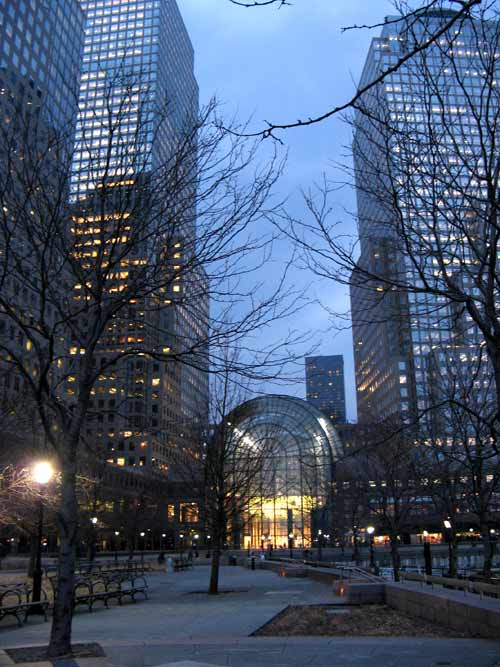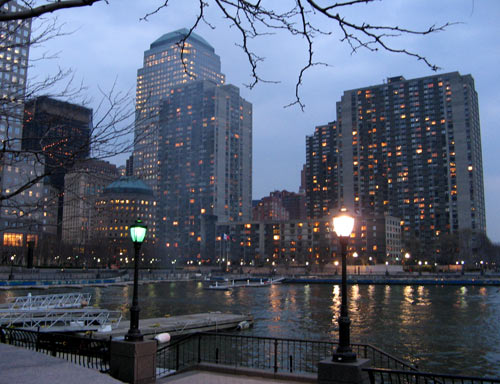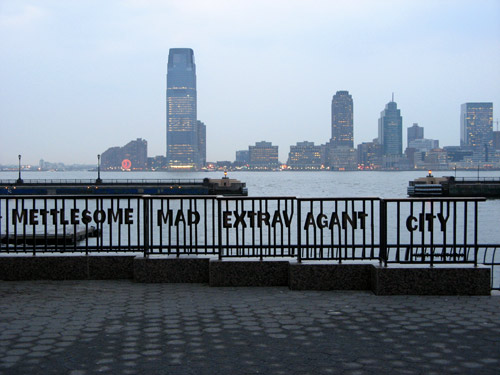It’s pretty, but is it Art?
After work, I crossed the West Side Highway to the World Financial Center where Riverhouse and the Sheldrake Organization were presenting an installment of their Contemporary Art and Design Series. The series is being curated by Brett Littman, Deputy Director of the P.S.1 Contemporary Art Center.
The Cesar Pelli-designed Winter Garden at dusk — a 120-foot-high vaulted room of steel and glass overlooking the Hudson River:



Tonight’s feature speaker was freelance writer and author Aric Chen. Chen is currently a contributing editor for *surface, I.D., and Interior Design magazines, contributing writer for Metropolis, GQ, Art & Auction, The Architect’s Newspaper and The New York Times, and a reporter for the “Intelligencer” column of New York magazine.
Chen led a discussion about the emerging market for limited edition design objects, and how the marketplace has responded to the blurring line between art and design. One inspiration for the talk was the Cooper Hewitt National Design Museum’s 2004-2005 exhibition, boldly titled “Design ≠ Art,” which featured objects representing the work of 18 artists from the late 1960s to the present. The trend of “furniture-as-sculpture,” and an overall increased interest in design is evidenced by the proliferation of stores such as Design Within Reach, and even more accessibly, the “design democracy” of Target’s Michael Graves and Philippe Starck lines.
This fetishization of ordinary objects can trace its nascent beginnings to the World War I-era with Marcel Duchamp’s famously displaced urinal, Fountain (1917) , which in 2004, was heralded as the most significant work of modern art in history.
Certainly one can celebrate the formal beauty in even the most utilitarian objects; Oscar Wilde once stated that “all beautiful things are made by those who strive to make something useful.” (Though he also famously wrote in The Picture of Dorian Gray: “All art is quite useless!”)
With the increased awareness of good design comes increased marketability and potential for commercialization — at both ends of the spectrum. The masses get their Graves Alessi tea kettles and on the high-end, there is a suddenly emerging market for limited edition design showpieces. Chen expressed reservations about these items, which have a value based almost solely on their artificially imposed scarcity — an entire market based on superexclusive limited runs and rapid-fire turnover. Hmm…sounds familiar.
Artists like Tobias Wong have taken the aesthetic to the extreme with his whimsical faux-crystal McDonald’s cups and solid gold McDonald’s coffee stirrers, mocking branding, conspicuous consumption, celebrity and class culture.
Incidentally, those original spoon-tipped plastic stirrers that Wong used as a model were withdrawn from use by the fast-food chain in 1980, after it became widely known that cocaine users were using them for unintended purposes. It’s a helluva drug.
The World Financial Center’s waterfront esplanade, excerpting Walt Whitman’s “City of Ships“:
City of the world! (for all races are here;
All the lands of the earth make contributions here;)
City of the sea! city of hurried and glittering tides!
City whose gleeful tides continually rush or recede, whirling in and out, with eddies and foam!
City of wharves and stores! city of tall façades of marble and iron!
Proud and passionate city! mettlesome, mad, extravagant city!

There are 2 Comments ... It’s pretty, but is it Art?
JL used to work at *surface years ago. Maybe she knows Aric.
April 4, 2007
Hmm, yes: you’ve mentioned this before. Aric seems like a friendly fellow; he mingled with the attendees at the reception before and after.
Go for it ...
Search
Popular Tags
Categories
Archive
- July 2010
- July 2009
- January 2009
- November 2008
- September 2008
- August 2008
- July 2008
- June 2008
- May 2008
- April 2008
- March 2008
- February 2008
- January 2008
- December 2007
- November 2007
- October 2007
- September 2007
- August 2007
- July 2007
- June 2007
- May 2007
- April 2007
- March 2007
- February 2007
- January 2007
- December 2006
- November 2006
- October 2006
- September 2006
- August 2006
- July 2006
- June 2006
April 2, 2007